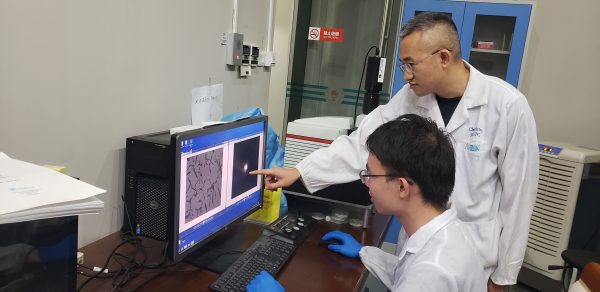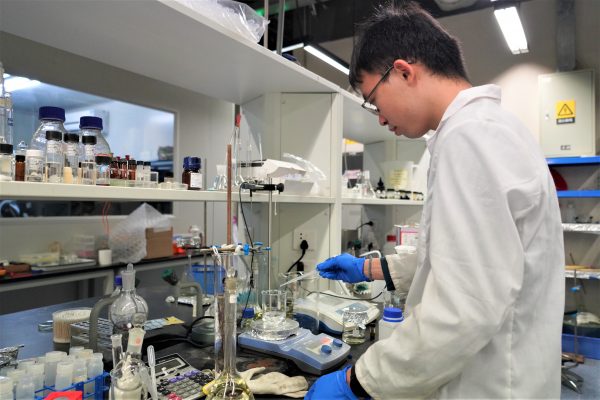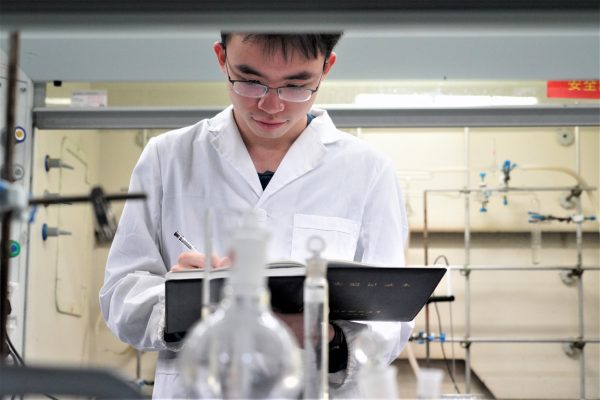Undergraduate research is at the core of Southern University of Science and Technology (SUSTech). It represents the opportunity for every student to innovate in scientific research, to make a difference for the world. Scientific inquiry is a fundamental part of all our undergraduate programs, with research outcomes presenting the capstone experience of our undergraduate degrees. Interdisciplinary research can change the world, clarifying career directions, and develop skills that can be applied to numerous fields. We spoke to several students to see how we had helped them achieve their dreams.
When it comes to facing the environmental challenges facing the world today and the future, some students choose to study the environmental sciences or change majors to head down this academic pathway. However, Qikun HU (’20, Chemistry) took a distinctly different path, opting to follow his heart to study Chemistry and investigate photovoltaic cells. It represents his dream as a high school student, where he would grow crystals in what little spare time he had.
As a young man from Fujian Province, Qikun HU is a studious gentleman, dedicating himself to his education and squeezing in chemistry experiments in his spare time. His desire to work to support nature to take advantage of the abundant solar energy to power the earth efficiently and inexpensively saw him head to SUSTech.

In his mind, SUSTech is perfect for him, as he can conduct research at the earliest opportunity. He committed himself to his studies and research. He joined Associate Professor Zongxiang XU’s research group towards the end of his freshman year.
During his earliest experiences in the laboratory, he received excellent guidance from Associate Professor Zongxiang XU and the senior students. Despite Qikun HU’s inexperience, he was able to overcome these problems over time.
The path of a scientific researcher is not always a smooth one. Qikun HU referred to his summer holiday as a freshman, when he was working in the laboratory. He made a critical error that destroyed the work of a colleague that had taken several months. Many pieces of vital instruments were damaged, setting back the experiment by three or four months.

Expecting to be scolded, he was surprised to be told that it was okay to make mistakes and that it was more important to learn from them so he would not make them again. This tolerance helped him understand how to become more careful in his scientific research, and how to become more comfortable around scientific equipment.
Qikun HU’s continual progress in the laboratory eventually saw him published as a first author, in a paper titled, ”P3HT/Phthalocyanine Nanocomposites as Efficient Hole‐Transporting Materials for Perovskite Solar Cells.” It was published early in his junior year and marked the beginning of a veritable waterfall of publications for Qikun HU.
It is the publication of these papers that has been the highlight for Qikun HU’s time at SUSTech. His papers include many first authorships and cover papers:
– P3HT with Zn(C6F5)2as p‐type Dopant for Enhanced Performance of Planar Perovskite Solar Cell
His progress in this field has seen developments in photovoltaic solar cells, that offer commercial applications. However, Qikun HU is convinced that more work needs to be done in the field.
Thinking about his future, he has also looked at computational chemistry to enhance his skillset. Qikun HU believes that it will help researchers find and understand the mechanisms behind how perovskite solar cells work while guiding them towards their optimal operations.

Qikun HU is now looking at different additives to the perovskite to improve the performance and thermal stability of solar cells. He is also collaborating with some companies to implement large-area perovskite solar cells, to test their efficiency and effectiveness.
With his move to Singapore to complete a joint-Ph.D with the National University of Singapore (NUS), Qikun HU has a firm plan in mind. He wants to be able to fabricate high-performance and stable perovskite solar cells at a low cost. Once that stage is reached, then the technology could be applied to large-scale installations to maximize performance in both large and flexibly-shaped areas. He acknowledges there is a long way to go in this area, but he is committed to this.
In reviewing the last four years at SUSTech, Qikun HU believes that the support of SUSTech and Associate Professor Zongxiang XU was critical to his development. Their trust in him was critical to his development, even at times when he hit bottlenecks in his scientific research. To this day, he believes that the decision to come to SUSTech is a fateful one.
Message for students looking at undergraduate research
Once you find a potential pathway, believe in yourself and go ahead. Never give up and communicate with your supervisor frequently. Success may come late, but it will come.

